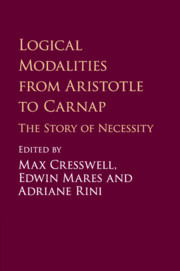Book contents
- Frontmatter
- Contents
- List of Figures and Tables
- List of Contributors
- List of Abbreviations
- Introduction
- 1 Aristotle on the Necessity of the Consequence
- 2 Aristotle on One- Sided Possibility
- 3 Why Does Aristotle Need a Modal Syllogistic?
- 4 Necessity, Possibility, and Determinism in Stoic Thought
- 5 Necessity in Avicenna and the Arabic Tradition
- 6 Modality without the Prior Analytics: Early Twelfth Century Accounts of Modal Propositions
- 7 Ockham and the Foundations of Modality in the Fourteenth Century
- 8 Theological and Scientific Applications of the Notion of Necessity in the Mediaeval and Early Modern Periods
- 9 Locke and the Problem of Necessity in Early Modern Philosophy
- 10 Leibniz's Theories of Necessity
- 11 Leibniz and the Lucky Proof
- 12 Divine Necessity and Kant's Modal Categories
- 13 Charles Sanders Peirce on Necessity
- 14 The Development of C. I. Lewis's Philosophy of Modal Logic
- 15 Carnap's Modal Predicate Logic
- Bibliography
- Index
3 - Why Does Aristotle Need a Modal Syllogistic?
Published online by Cambridge University Press: 05 September 2016
- Frontmatter
- Contents
- List of Figures and Tables
- List of Contributors
- List of Abbreviations
- Introduction
- 1 Aristotle on the Necessity of the Consequence
- 2 Aristotle on One- Sided Possibility
- 3 Why Does Aristotle Need a Modal Syllogistic?
- 4 Necessity, Possibility, and Determinism in Stoic Thought
- 5 Necessity in Avicenna and the Arabic Tradition
- 6 Modality without the Prior Analytics: Early Twelfth Century Accounts of Modal Propositions
- 7 Ockham and the Foundations of Modality in the Fourteenth Century
- 8 Theological and Scientific Applications of the Notion of Necessity in the Mediaeval and Early Modern Periods
- 9 Locke and the Problem of Necessity in Early Modern Philosophy
- 10 Leibniz's Theories of Necessity
- 11 Leibniz and the Lucky Proof
- 12 Divine Necessity and Kant's Modal Categories
- 13 Charles Sanders Peirce on Necessity
- 14 The Development of C. I. Lewis's Philosophy of Modal Logic
- 15 Carnap's Modal Predicate Logic
- Bibliography
- Index
Summary
To supply a connection between the modal syllogistic developed in Aristotle's Prior Analytics and the rest of his philosophy interpreters frequently assume that the modal syllogistic must somehow have been intended for use in Aristotle's theory of demonstration as found in the Posterior Analytics, and, on this basis, try to find explanations for some of its peculiarities. According to the most common such proposal, Aristotle's claims about necessity syllogisms are often explained by making a distinction between essential and accidental predication and supposing that the necessary premises of demonstrations are necessary because they rest on definitional or essential predications. The evidence adduced for such claims is essentially that if we suppose Aristotle to have some notions in mind that appear in the Posterior Analytics when he develops the modal syllogistic, then we can see why he makes the claims that he does about what is or is not a necessary proposition, or a valid inference, etc. However, these are at best speculative answers to the question why Aristotle developed the modal syllogistic as he did, given that he had already decided to develop it. They do not explain why he might have wanted to develop such a theory in the first place. They do not tell us what use the modal syllogistic might have been to him in his theory of demonstration – or, more precisely, what use he might have had in mind for it. In order even to speculate productively about that, we should really like to identify some puzzles or difficulties concerning demonstrative science that results of the modal syllogistic might help resolve. At the very least, we would hope to find some evidence in the Posterior Analytics of use of even some general results found in the modal syllogistic. However, all we see is the claim that if what is demonstrated is itself necessary, then the premises from which it is demonstrated must also be necessary.
In order to link the modal syllogistic with the rest of Aristotle's philosophy we must look elsewhere. It turns out that there is a passage in the Prior Analytics in which Aristotle articulates a principle about possibility, which is almost word for word identical with a passage which appears in book Θ of the Metaphysics.
- Type
- Chapter
- Information
- Logical Modalities from Aristotle to CarnapThe Story of Necessity, pp. 50 - 69Publisher: Cambridge University PressPrint publication year: 2016
- 2
- Cited by



